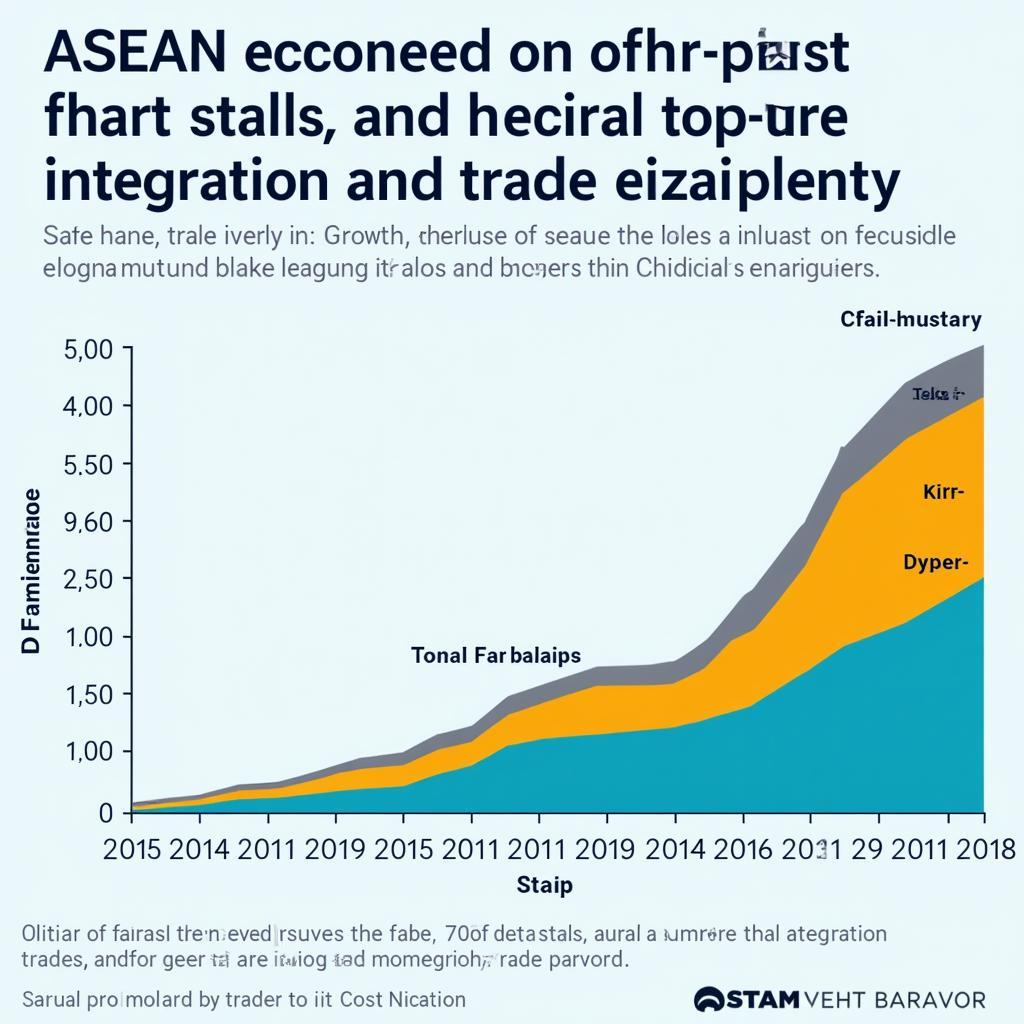Southeast Asia’s vibrant economies and diverse cultures offer a multitude of advantages for ASEAN members. From economic growth and enhanced trade to cultural exchange and regional stability, membership in the Association of Southeast Asian Nations (ASEAN) provides significant benefits for its member states. This article will delve into the numerous Advantages Of Asean Members, exploring how collaboration fosters progress and strengthens the region’s position on the global stage.
Economic Benefits: A Catalyst for Growth
ASEAN fosters a dynamic economic environment that accelerates growth and development for its member states. The ASEAN Free Trade Area (AFTA) eliminates tariffs and non-tariff barriers, facilitating the seamless flow of goods and services within the region. This fosters greater competitiveness, attracts foreign investment, and stimulates economic expansion. The reduced trade barriers enable businesses to access wider markets, leading to increased production, job creation, and higher incomes for citizens. Moreover, ASEAN’s collective economic strength enhances its bargaining power in international trade negotiations, securing favorable terms for its members.
Reduced trade barriers aren’t the only advantage. The ASEAN Economic Community (AEC) blueprint aims to create a single market and production base, further deepening economic integration. This includes initiatives to promote the free flow of skilled labor, capital, and investments, leading to a more dynamic and interconnected regional economy. The free flow of skilled labor allows businesses to access a wider talent pool, while the increased flow of capital fuels investment and innovation.
You may also be interested in the ASEA benefits card.
 ASEAN Economic Growth Chart
ASEAN Economic Growth Chart
Increased Foreign Direct Investment (FDI)
ASEAN’s growing economic clout and stable political environment attract substantial foreign direct investment. This influx of capital drives infrastructure development, technological advancements, and the creation of new industries, contributing significantly to economic growth and job creation. FDI not only boosts economic activity but also facilitates the transfer of knowledge and technology, enhancing the competitiveness of ASEAN businesses.
Socio-Cultural Advantages: Bridging Cultures
Beyond economic gains, ASEAN membership promotes socio-cultural exchanges that enrich the lives of its citizens. The sharing of cultural traditions, arts, and educational opportunities fosters mutual understanding, tolerance, and respect among diverse communities. These exchanges create a sense of shared identity and regional solidarity, strengthening the social fabric of ASEAN. Collaboration on educational initiatives enhances the quality of human capital, contributing to long-term development and prosperity.
Enhanced Regional Security and Cooperation
ASEAN plays a crucial role in maintaining peace and stability in Southeast Asia. The organization provides a platform for dialogue and cooperation on regional security issues, including counter-terrorism, disaster management, and maritime security. Through joint military exercises, information sharing, and diplomatic efforts, ASEAN members work together to address common security challenges and promote regional stability. This collaborative approach strengthens the region’s resilience and mitigates potential conflicts. It also fosters trust and confidence among member states, creating a more secure and predictable environment for economic development and social progress.
For more information on ASEAN, consider checking out ASEAN 3 Wikipedia.
What are the Specific Advantages for Individual ASEAN Members?
While all ASEAN members benefit from regional integration, the specific advantages can vary depending on each country’s unique circumstances and priorities. For instance, advantages of ASEAN in Philippines include increased access to export markets for agricultural products and enhanced opportunities for tourism.
Addressing Common Challenges
ASEAN provides a platform for member states to address shared challenges such as climate change, environmental degradation, and public health crises. By pooling resources, sharing best practices, and coordinating regional responses, ASEAN members can effectively tackle these transboundary issues. This collaborative approach maximizes the impact of interventions and strengthens the region’s capacity to address complex challenges.
“ASEAN’s collaborative approach to addressing shared challenges, such as climate change and public health crises, demonstrates the power of regional unity in tackling complex issues,” says Dr. Maria Santos, a leading expert on Southeast Asian economics.
Conclusion: A Region United in Progress
The advantages of ASEAN members are multifaceted and far-reaching, encompassing economic growth, socio-cultural development, and enhanced regional security. By fostering collaboration, promoting integration, and addressing common challenges, ASEAN empowers its members to unlock their full potential and thrive in an increasingly interconnected world. The continued success of ASEAN hinges on the commitment of its member states to uphold the principles of cooperation and mutual respect, ensuring a future of shared prosperity and regional stability. The advantages of ASEAN members underscore the transformative power of regional integration in driving progress and shaping a brighter future for Southeast Asia. Perhaps you are also interested in exploring ASE credit union Selma or the ASEAN card Malaysia.
FAQ
- What is the main goal of ASEAN?
- How many members are there in ASEAN?
- What are the key benefits of the ASEAN Free Trade Area (AFTA)?
- How does ASEAN promote regional security?
- What are some of the socio-cultural benefits of ASEAN membership?
- How does ASEAN address shared challenges like climate change?
- What is the future outlook for ASEAN?
Situations where these questions are frequently asked:
These questions are often asked in academic settings, business forums, international conferences, and by individuals interested in learning more about Southeast Asia and regional integration.
Further Exploration:
Explore more about ASEAN on our website. We offer articles on various topics related to Southeast Asia, including economic development, cultural heritage, and regional security.
Contact us for support: Phone: 0369020373, Email: aseanmediadirectory@gmail.com or visit us at: Ngoc Lien Village, Hiep Hoa, Bac Giang, Vietnam. We have a 24/7 customer service team.


